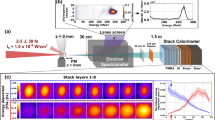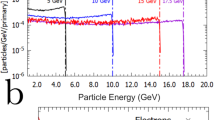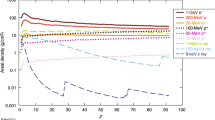Abstract
OBSERVATIONS of the tracks of electron–positron ‘pairs’, produced by the passage of γ-radiation through photographic emulsions, have been described recently by Coates and Herz1. By measuring the energy of the particles of a given pair by the scattering method2,3, in those cases in which the two trajectories are of sufficient length, it is possible to determine the quantum energy of the γ-rays.
This is a preview of subscription content, access via your institution
Access options
Subscribe to this journal
Receive 51 print issues and online access
$199.00 per year
only $3.90 per issue
Buy this article
- Purchase on Springer Link
- Instant access to full article PDF
Prices may be subject to local taxes which are calculated during checkout
Similar content being viewed by others
References
Coates, A. C., and Herz, R. H., Phil. Mag., 40, 1088 (1949).
Goldschmidt-Clermont, Y., King, D. T., Muirhead, H., and Ritson, D. M., Proc. Phys. Soc., 61, 183 (1948).
Davies, J. H., Lock, W. O., and Muirhead, H., Phil. Mag., 40, 1250 (1949).
Author information
Authors and Affiliations
Rights and permissions
About this article
Cite this article
KING, D. Determination of the Energy of High-Energy γ-Rays by the Photographic Method. Nature 165, 526–527 (1950). https://doi.org/10.1038/165526a0
Issue Date:
DOI: https://doi.org/10.1038/165526a0
Comments
By submitting a comment you agree to abide by our Terms and Community Guidelines. If you find something abusive or that does not comply with our terms or guidelines please flag it as inappropriate.



